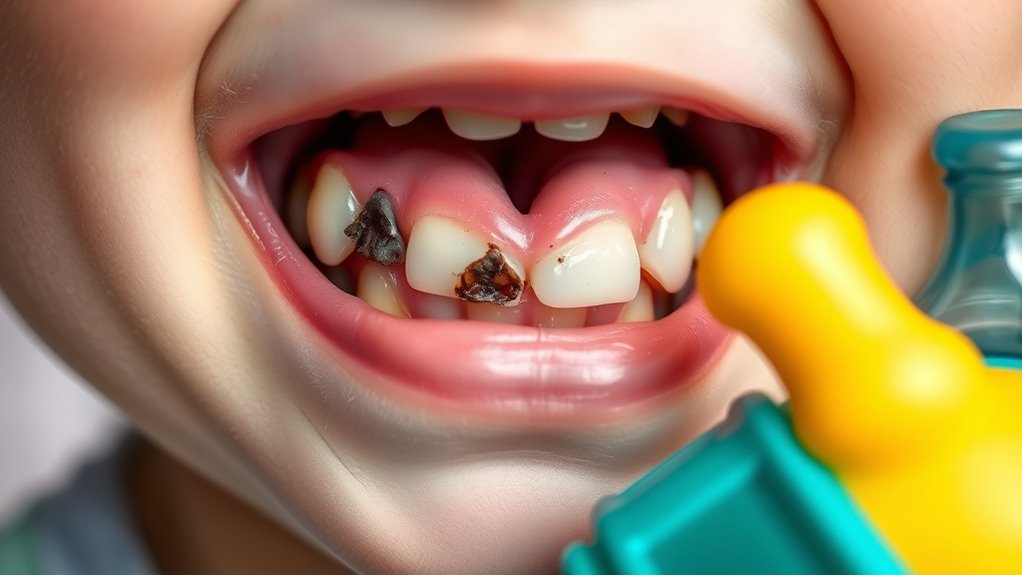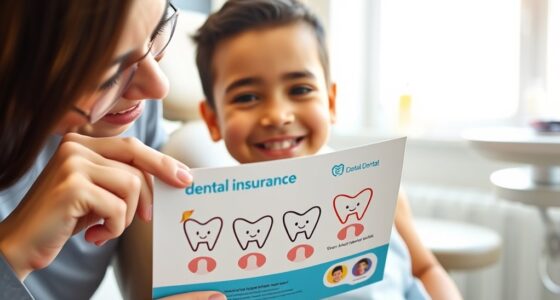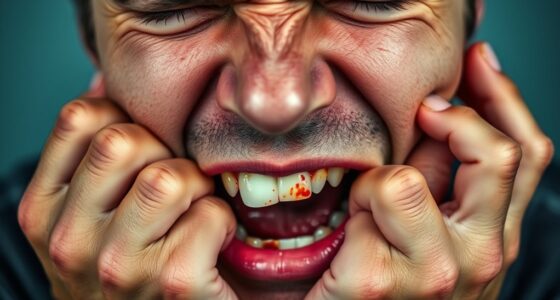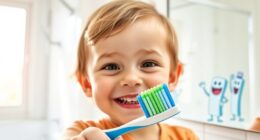Prolonged use of sippy cups and bottles can harm your child’s dental health by causing tooth decay, malocclusion, and improper jaw development. Sugary drinks around teeth increase the risk of cavities, and extended sucking habits can misalign teeth. Using cups with valves or delaying the switch to open cups only makes matters worse. Fortunately, there are safer options and signs to watch for—if you keep going, you’ll discover how to better protect your child’s smile.
Key Takeaways
- Prolonged use of sippy cups and bottles increases the risk of baby bottle tooth decay from sugary liquids lingering on teeth.
- Extended sucking habits can cause malocclusion, misaligned teeth, and open bites, affecting dental development.
- Using sippy cups with valves or spouts hampers oral muscle development and proper swallowing patterns.
- Transitioning to open cups by 12-14 months helps promote healthy oral growth and reduces decay risk.
- Regular dental check-ups are essential to monitor for early signs of decay, misalignment, or other dental issues caused by cup use.
How Prolonged Use of Bottles and Sippy Cups Impacts Dental Development

Prolonged use of bottles and sippy cups can considerably affect your child’s dental development. When sugary liquids pool around teeth, it increases the risk of baby bottle tooth decay, which can harm oral health.
Prolonged bottle and sippy cup use can lead to tooth decay and dental development issues.
Extended sucking on bottles and cups with sugary drinks can also lead to malocclusion and open bites, often requiring orthodontic treatment later.
Using sippy cups with spouts or valves can hinder proper oral muscle development, affecting the natural growth of the jaw and teeth alignment.
Delaying the progression to open cups interferes with healthy swallowing patterns and muscle use, further impacting dental development.
It’s essential to encourage moving to open cups early to promote better oral health, proper muscle development, and prevent long-term dental issues.
The Risk of Baby Bottle Tooth Decay and Its Long-Term Effects

Baby bottle tooth decay happens when sugary liquids like milk, formula, or juice stay on your child’s teeth for too long, feeding harmful bacteria.
Prolonged sippy cup use with sugary drinks increases the risk of cavities in primary teeth, which can affect early childhood dental health.
Bacteria feed on the leftover sugars, producing acids that weaken enamel and cause decay, especially on front teeth.
If you don’t practice good dental hygiene, extended use of bottles or sippy cups can accelerate decay and lead to long-term dental issues.
Dental experts stress removing sugary drinks from bottles by 12-18 months to prevent baby bottle tooth decay.
Ignoring these risks can result in more severe oral health problems later, emphasizing the importance of early prevention for your child’s future smile.
How Extended Use Contributes to Malocclusion and Crooked Teeth
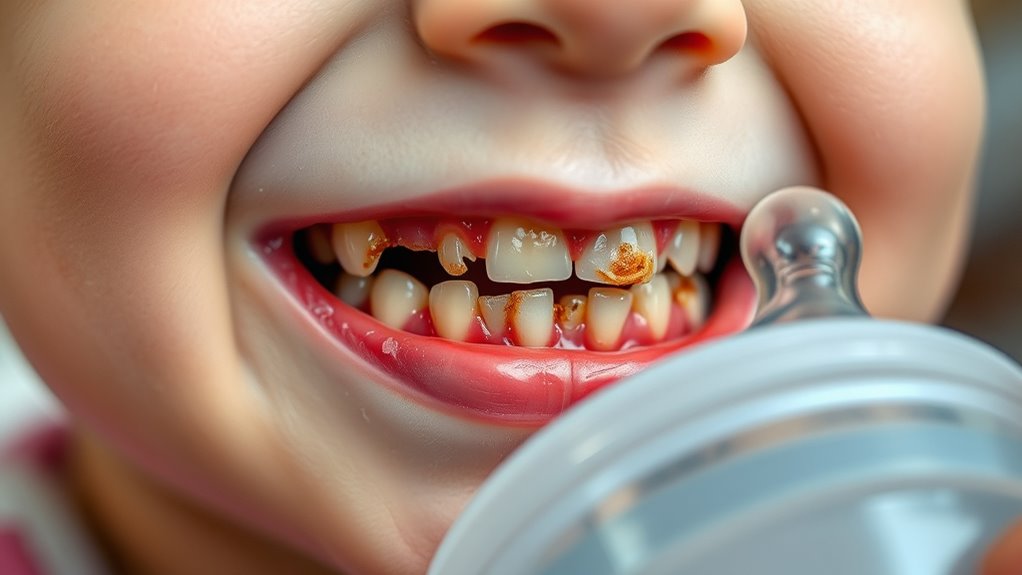
Extended use of sippy cups and bottles can substantially impact your child’s jaw development, often resulting in malocclusion and crooked teeth. Prolonged sucking habits from spouted cups or bottles encourage improper oral habits, which can push teeth out of alignment and hinder normal jawbone growth. This sustained pressure can also lead to the development of dental malocclusion, affecting bite and alignment as the child grows. This prolonged use increases the risk of an open bite, where the upper and lower teeth don’t meet properly, leading to orthodontic issues later on. The repetitive motion and pressure from extended sucking influence jaw development, causing misaligned teeth and crowded dental arches. Additionally, early intervention can prevent more severe orthodontic problems in the future. Research shows that proper oral habits are essential in guiding healthy dental development, emphasizing the importance of early behavioral changes. Developing awareness about preventive strategies can significantly reduce the likelihood of future dental complications.
Choosing Safer Alternatives to Protect Your Child’s Smile
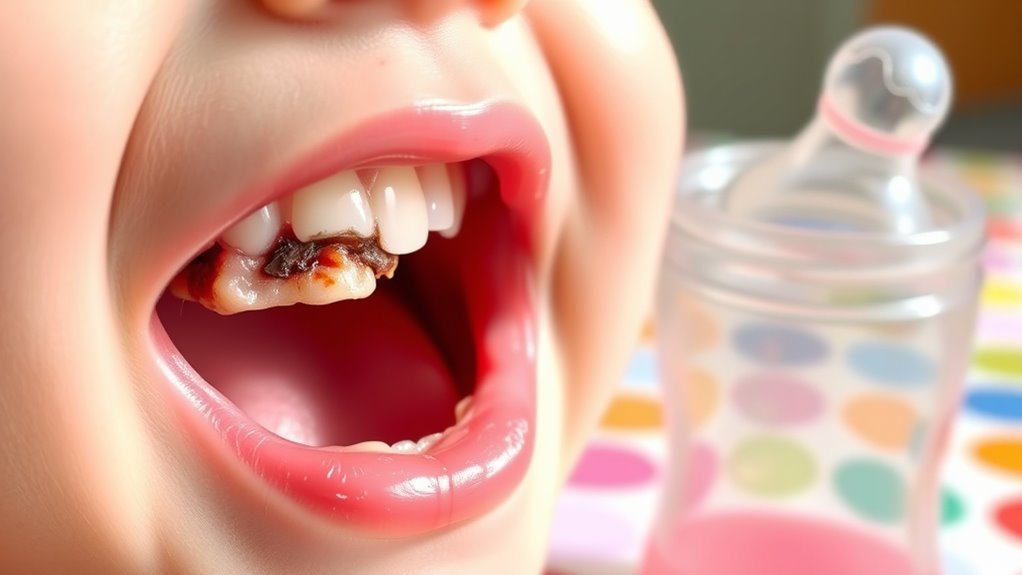
Switching to safer drinking options can considerably protect your child’s dental health. Opt for sippy cups without valves, which encourage proper oral development and reduce the risk of misaligned teeth. An open cup or training cup helps facilitate your child from bottles and sippy cups, promoting natural swallowing and strengthening oral muscles. Choose cups made of BPA-free plastic or stainless steel to avoid chemical exposure and guarantee safety. Limit the use of sippy cups and bottles to mealtimes only, guiding your child to a regular cup by 12-14 months. This change helps prevent dental problems caused by prolonged use. Proper oral development can be supported by choosing age-appropriate cups and minimizing prolonged exposure to liquids that can cause decay. High refresh rates in projectors enhance visual clarity during screen time, reducing eye strain for children and making it easier for them to enjoy their favorite content safely. Additionally, educating caregivers about the potential dental risks of prolonged bottle use can further promote healthy habits from an early age. Incorporating remote work tips like establishing a routine can also help parents balance dental care with other responsibilities.
Recognizing Signs That Indicate It’s Time to Consult a Pediatric Dentist
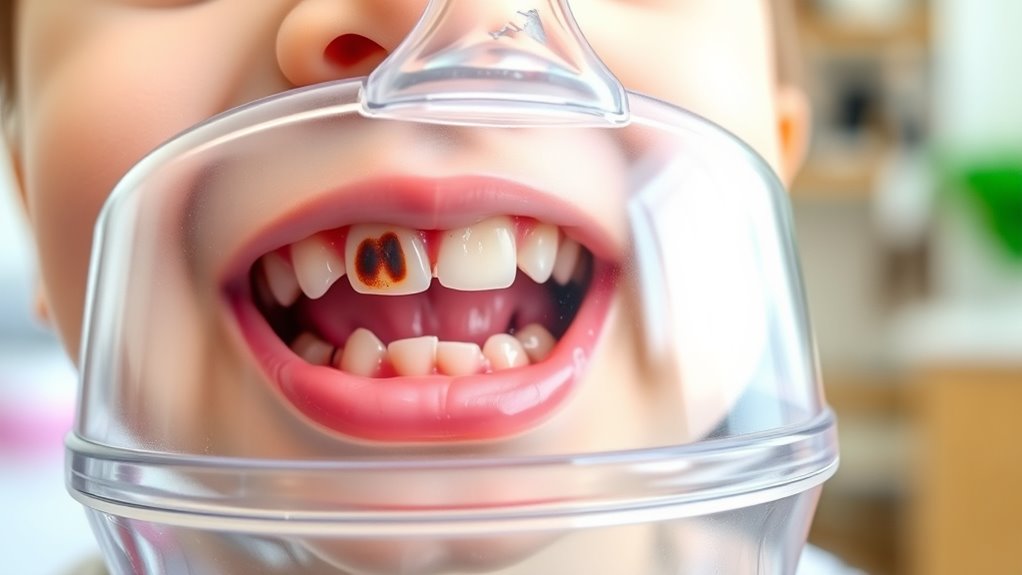
Knowing when to consult a pediatric dentist is essential for maintaining your child’s oral health. Watch for signs like crooked teeth or uneven bites, which may indicate malocclusion from prolonged sippy cup use.
Persistent bad breath, bleeding gums, or spots on teeth could signal early decay or enamel damage needing immediate dental assessment. Discoloration or white spots often point to enamel erosion caused by sugary liquids.
Also, be alert to recurrent infections or swelling around the gums, which suggest dental decay or infections requiring prompt attention. If your child struggles with speech, swallowing, or has an open bite, these developmental issues may be linked to oral health signs.
Consulting a pediatric dentist ensures early diagnosis, helping address potential issues before they escalate and supporting your child’s overall development.
Frequently Asked Questions
Do Sippy Cups Cause Teeth Problems?
You might wonder if sippy cups cause teeth problems. Yes, if you or your child use them excessively or beyond the recommended age, it can lead to issues like crooked teeth, malocclusion, and cavities.
Prolonged use with sugary liquids can damage enamel. To prevent this, limit sippy cup use, especially after age one, and encourage regular drinking from cups to promote healthy jaw and tooth development.
Why Are Sippy Cups No Longer Recommended?
You wonder why sippy cups aren’t recommended anymore. Studies show that prolonged use increases your child’s risk of dental issues.
Over 50% of toddlers using them beyond age two develop misaligned teeth. Sippy cups with valves can hinder jaw development, delay speech, and cause malocclusion.
Moving to open cups early helps promote healthier oral growth, reducing cavities and preventing long-term dental problems.
Do Dentists Recommend Sippy Cups?
Dentists generally don’t recommend keeping your child on sippy cups long-term. They suggest using them temporarily, ideally moving to open cups by age one to support healthy jaw and teeth development.
If your child uses a sippy cup, choose ones without valves or spouts, and avoid sugary liquids.
Regular dental checkups help catch any issues early, ensuring your child’s oral health stays on track.
Is Drinking From a Baby Bottle Bad for Your Teeth?
Drinking from a baby bottle can be harmful to your teeth if you don’t do it carefully. When you sip sugary liquids like milk, juice, or formula over time, bacteria feed on the residues, causing cavities and enamel erosion.
Sleeping with a bottle allows liquids to pool, increasing decay risk. To protect your teeth, avoid prolonged bottle use and switch to cups by age 1–1.5 years.
Conclusion
If you let your child use sippy cups or bottles for too long, you’re increasing their risk of dental problems like tooth decay and crooked teeth. Did you know that about 25% of children develop bottle tooth decay by age 3? By switching to safer alternatives and watching for signs it’s time to see a dentist, you can safeguard their smile now and in the future. Taking these steps ensures healthier teeth and happier smiles for your little one.
